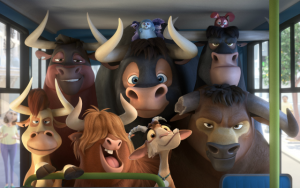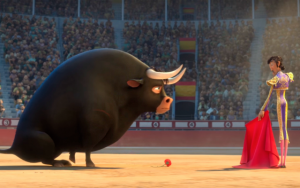CP24: THE EMMY AWARDS FIND A HOST, BUT THE GG’S STILL HAVEN’T.
 I join CP24 to talk why the Emmys have been able to find a host for the awards ceremony, but the Golden Globes haven’t.
I join CP24 to talk why the Emmys have been able to find a host for the awards ceremony, but the Golden Globes haven’t.
Watch the whole thing HERE!
 I join CP24 to talk why the Emmys have been able to find a host for the awards ceremony, but the Golden Globes haven’t.
I join CP24 to talk why the Emmys have been able to find a host for the awards ceremony, but the Golden Globes haven’t.
Watch the whole thing HERE!
 A weekly feature from from ctvnews.ca! The Crouse Review is a quick, hot take on the weekend’s biggest movies! This week Richard looks at ”Star Wars: The Last Jedi,” the no-bull kid’s tale “Ferdinand” and the coming-of-age romance “Call Me By Your Name.”
A weekly feature from from ctvnews.ca! The Crouse Review is a quick, hot take on the weekend’s biggest movies! This week Richard looks at ”Star Wars: The Last Jedi,” the no-bull kid’s tale “Ferdinand” and the coming-of-age romance “Call Me By Your Name.”
Watch the whole thing HERE!
 By Richard Crouse – Metro In Focus
By Richard Crouse – Metro In Focus
One of the most enduring children’s tales of the 20th century was written in a single afternoon in 1936. Author Munro Leaf says it only took “25 minutes on a rainy Saturday” to pen The Story of Ferdinand, which he planned as a make-work project for his friend, illustrator Robert Lawson.
This weekend John Cena, Kate McKinnon and Bobby Canavale lend their voices to the animated Ferdinand.
The story about a big bull with an even bigger heart has been popular with readers for generations. In 1938 Life magazine raved, “Ferdinand is the greatest juvenile classic since Winnie the Pooh” and urged adults to “buy the book largely for their own pleasure and amusement.”
The success of the book took people by surprise, including Leaf’s widow who told Publisher’s Weekly, “What happened with Ferdinand is still a mystery. After Christmas, sales increased every week, and within 13 months, eight editions had been published. Ferdinand appeared as a giant balloon in the Macy’s Thanksgiving Day Parade; a Ferdinand song made the hit parade; and in December of 1938, The Story of Ferdinand nudged Gone with the Wind off the top of the bestseller lists.”
The book has never gone out of print and has been translated into more than 60 foreign languages, including a Latin version called Ferdinandus Taurus. Luminaries like H. G. Wells, Gandhi and Franklin Roosevelt approved of the book’s story of a bull that prefers smelling flowers to bullfighting and it was the only American children’s book available in Stalin-era Poland, but it wasn’t universally loved.
Released nine months before the outbreak of the Spanish Civil War, supporters of Francisco Franco thought it promoted dangerous pacifist ideas. As a result it was banned in Spain and remained so until 1975. Others suggested the book promoted fascism, anarchism and communism. The Cleveland Plain Dealer even ranted that the book was “corrupting the youth of America.” The New York Times, however, rejected the political metaphors, praising the book’s message of being true to oneself.
Adolf Hitler called it “degenerate democratic propaganda” and ordered all copies burned. In reaction, at the end of the Second World War, 30,000 copies were rushed into print and distributed to Germany’s children as a symbol of peace.
Walt Disney loved the story and commissioned a short film, Ferdinand the Bull, in 1938. In addition to producing the movie, Disney supplied the voice of Ferdinand’s mother and was the model for the Matador character. The short was a big hit, winning the Oscar for Best Short Subject. The film is particularly popular in Sweden where it has aired every Christmas Eve since 1959 as a segment on the annual Disney show Donald Duck and His Friends Wish You a Merry Christmas. In 1982 the Christmas tradition was broken when Ferdinand the Bull was replaced with The Ugly Duckling on the annual broadcast. The switch caused collective national Yuletide outrage and Ferdinand was returned to the show the next year where he has remained ever since.
No one is exactly sure why Ferdinand has had such a long-lasting impact, although one scholar suggests it’s because it crosses gender lines, offering up a character that appeals to boys and girls.
 Adolf Hitler called “The Story of Ferdinand” “degenerate democratic propaganda” and ordered all copies burned. In spite of that or perhaps because of that, the story of the big bull with an even bigger heart became a publishing phenomenon, outselling ”Gone with the Wind” in 1938. The children’s book has never gone out of print and still sells in healthy amounts today.
Adolf Hitler called “The Story of Ferdinand” “degenerate democratic propaganda” and ordered all copies burned. In spite of that or perhaps because of that, the story of the big bull with an even bigger heart became a publishing phenomenon, outselling ”Gone with the Wind” in 1938. The children’s book has never gone out of print and still sells in healthy amounts today.
Those sales will likely increase with the release of “Ferdinand,” a colourful animated 3D movie starring the voices of John Cena, Kate McKinnon and Bobby Canavale from the folks who brought us “Ice Age” and “Robots.”
As a calf being raised at Casa del Toro to be a fighting bull Ferdinand (voice of Cena) asks his father, a fearsome bull, “Can I be a champion of not fighting?” More into carnations than combat, he doesn’t want to follow in his father’s footsteps, chasing
Matadors in bullfighting arenas. When his father is killed in the ring Ferdinand hoofs it, running away to live on a flower farm.
He grows to be a fearsome looking bull, all chest and pointed horns, but remains the same sweet tempered creature he always was. Recaptured, he’s sent back to Casa del Toro and groomed for the ring or the slaughterhouse. Fight or food, those are his options. Selected by bullfighter El Primero (Miguel Angel Silvestre) Ferdinand, along with a goofy goat named Lupe (Kate McKinnon)—“ I’m here to calm you so you can maim and gore later,” she says.—and three devious hedgehogs named Uno, Dos and Cuartro (Gina Rodriguez, Daveed Diggs and Gabriel Iglesias), he plans his escape.
The book is only 32 pages long but director Carlos Saldanha and team flesh out the story to feel organic to author Munro Leaf’s original vision of passive resistance in the face of violence. Pulled to ninety minutes, the story shows some stretch marks but remains likeable with lots of heart and plenty of gags.
The free-to-be-you-and-me anti-bullying messages are cleverly woven into the fabric of the tale. Ferdinand challenges the status quo, defying others to put him in any kind of box. It’s a powerful and timely lesson of acceptance wrapped in a colourful package that should delight kids. It should be noted that while the bull in a China shop gag will elicit giggles the scenes in the meat packing plant and the climactic bullfight might be too intense for very little children.
The voice work is lively and fun. As Lupe, McKinnon brightens things up in every scene she’s in but is underused in the latter part of the film.
“Ferdinand” could have used more Spanish flavour on the soundtrack. Bland pop songs fill the ears when flamenco might have been more evocative of the time and place but by and large this is an engaging no bull kid’s story with a valuable upfront message.
 Richard sits in with CTV NewsChannel’s Merella Fernandez to chat about the morning’s Emmy nominations, who was snubbed and who will win!
Richard sits in with CTV NewsChannel’s Merella Fernandez to chat about the morning’s Emmy nominations, who was snubbed and who will win!
Watch the whole thing HERE!